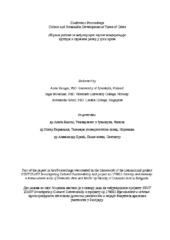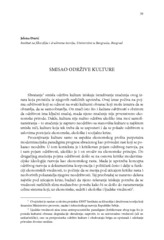Приказ основних података о документу
Smisao održive kulture / The Meaning of Sustainable Culture
| dc.contributor | Dragićević Šešić, Milena | |
| dc.contributor | Nikolić, Mirjana | |
| dc.contributor | Rogač Mijatović, Ljiljana | |
| dc.creator | Đurić, Jelena | |
| dc.date.accessioned | 2018-06-30T17:36:43Z | |
| dc.date.available | 2018-06-30T17:36:43Z | |
| dc.date.issued | 2014 | |
| dc.identifier.isbn | 978-86-82101-53-6 | |
| dc.identifier.uri | http://rifdt.instifdt.bg.ac.rs/123456789/1650 | |
| dc.description.abstract | The meaning of sustainable culture The meaning of sustainable culture and, beforehand, of the notion of sustainability, begins its definition with critique of „sustainable development“, as the legitimization of economic growth. One way the critique of growth is expressed is through the principle of „sustainable degrowth“. This sort of critique has influenced the provision of different meanings of sustainable development which, by consideration of the possibility of getting out of (economic, ecological and social) crisis, begins to connect with culture. The concept of sustainable development is compatible with sustainable culture, only if culture is not viewed as a mean to economic growth. Its meaning is discovered and realized by principles of sustainability which are potential factors of social transformation directed towards connecting ecological and human values. The problem is that the abilities for political engagement are weak, especially in underdeveloped countries, and there are only few of those dedicated to raise awareness on the necessity for change. The problem is also that most people do not see the connection between ideas and values that are spread out through media and education, and consumer lifestyle that endangers environment. This situation shows unsustainability of the dominating culture, which unfortunately could last until it is late for necessary changes. However, there are ideas and movements that practically show the meaning of sustainable culture – by choosing the lifestyles which include natural economy, reduced consumption, creative approach to life and work within community, dedication of time to art, to neighbors, community, and simply to life. These modern tendencies and practices have their counterpart in ancient worldviews and ways of life. In the past, they were present worldwide, yet their existence today, which is rare, shows that human kind in crisis should turn to the fundamental questions and explore spirituality in order to reestablish its relationship with nature and to discover the real meaning of sustainable culture. | en |
| dc.language.iso | sr | sr |
| dc.publisher | Beograd : Univerzitet umetnosti u Beogradu, Fakultet dramskih umetnosti; Institut za pozorište, film, radio i televiziju | sr |
| dc.relation | info:eu-repo/grantAgreement/MESTD/Integrated and Interdisciplinary Research (IIR or III)/43007/RS// | sr |
| dc.rights | openAccess | sr |
| dc.rights.uri | https://creativecommons.org/licenses/by/4.0/ | |
| dc.source | Culture and Sustainable Development at Times of Crisis / Kultura i održivi razvoj u doba krize | sr |
| dc.subject | sustainable development | sr |
| dc.subject | crisis | sr |
| dc.subject | degrowth | sr |
| dc.subject | resilience | sr |
| dc.subject | sustainable culture | sr |
| dc.title | Smisao održive kulture / The Meaning of Sustainable Culture | sr |
| dc.type | bookPart | sr |
| dc.rights.license | BY | sr |
| dcterms.abstract | Ђурић, Јелена; | |
| dc.citation.spage | 39 | |
| dc.citation.epage | 50 | |
| dc.type.version | publishedVersion | sr |
| dc.identifier.fulltext | http://rifdt.instifdt.bg.ac.rs/bitstream/id/3504/impressum.pdf | |
| dc.identifier.fulltext | http://rifdt.instifdt.bg.ac.rs/bitstream/id/3508/SmisaoOdrziveKulture.pdf | |
| dc.identifier.rcub | https://hdl.handle.net/21.15107/rcub_rifdt_1650 |


